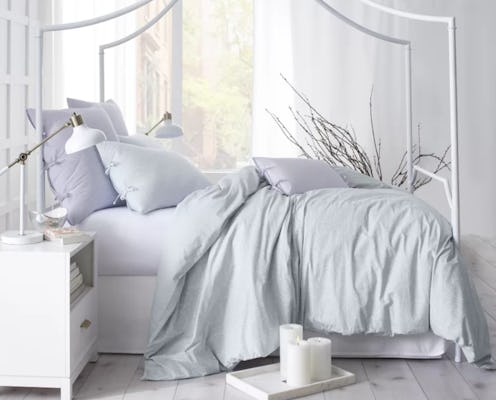Getting a good night's sleep can sometimes feel like chasing a unicorn, pointless because what you're after doesn't seem to exist. If your sleep space doesn't promote rest and relaxation, it's time to consider designing your bedroom for better sleep. A recent study by the Farnsworth Group, an engineering and architecture firm, found that 77 percent of people identified their bedroom as the area in their home that has the most impact on their well-being. In addition, The National Sleep Foundation noted that the average person spends one third of their time sleeping, which makes a solid case for making your bedroom a place of respite.
"Because sleep is so crucial to maintaining a healthy lifestyle, you want to make sure your bedroom is a place you can relax and rejuvenate," design expert Gena Kirk, vice president of home building company KB Home, tells Bustle. With Daylight Saving Time spring forward coming, this is an ideal time to switch up your bedroom concept to get more shut eye, and it's easier than you think. While redesigning your bedroom might feel overwhelming and seem expensive, there are little things you can do on the cheap to make your room more sleep friendly.
1Keep It Dark
"Natural light is great during the day, but at night, you need a dark room to help trigger your natural circadian rhythm. Select the right window treatments that can keep the room as dark as possible," Kirk says. A great way to block out the light is by investing in some blackout curtains. Not only do they keep your room dark, blackout curtains can keep the heat in during the winter and out during the summer.
2Keep It Quiet
Nighttime noise can be pretty disruptive to sleep. While you can use white noise apps, if you want to invest in the mother of all noise-blocking aides, Bose Noise-Masking Sleepbuds are touted as the solution for people who've tried everything else.
"At night, you’re trying to shut down completely, and the world is naturally more quiet — and when it’s quiet, even the slightest sound seems loud. Bedside machines can’t cover it, earplugs can’t block it, and earbuds meant for sitting, standing, or moving can’t be worn for hours laying down — especially on your side," Daniel Lee, systems engineer for Bose sleepbuds, said in a press release. "But Bose sleepbuds can. And if you’re someone who’s tried everything and nothing’s worked, or haven’t tried anything believing nothing will, we made them for you."
3Keep It Neutral
Believe it or not, the color scheme of your bedroom matters. "Using a neutral or cool color palette for the bedroom with flat finish paints help give your bedroom a calming effect," Kirk says. What's more, The National Sleep Foundation noted the people who choose blue hues for the bedroom sleep longer than those who choose other colors because shades of blue make people feel calm. If you can't paint your walls, opt for light blue bedding instead. Seriously, my entire apartment is designed in cream and light blue, and this color scheme definitely helps me feel more relaxed.
4Keep It Cool
The temperature of your bedroom can also affect your sleep. The National Sleep Foundation advised that in order to get the best sleep, your bedroom should be between 60 and 67 degrees. If you don't have air conditioning, it can be difficult to obtain this temperature during a heatwave. This is where having a few table fans can help. Place them on your nightstand and aim the fans toward you to create a cool and comfy sleep sanctuary. (Plus, if you don't want to spring for that white noise machine, these can be a stepping stone.)
5Keep It Fresh
If you think aromatherapy is too new age-y for you, get ready to change your mind. A study published in the journal Evidence-Based Complementary and Alternative Medicine found that lavender actually helps improve sleep quality. A great way to get the smell of lavender wafting toward you during the night is with an essential oil diffuser. Alternatively, you can use a lavender pillow spray. My favorite is a lavender mist by Asutra.
6Keep It Clutter Free
Believe it or not, clutter can make you feel bajiggity, which in turn can make it hard to sleep. In fact, U.S. News & World Report cited a sleep conference where data was presented linking clutter to sleep disorders. Even if you're not a minimalist by nature, you can tune into Tidying Up With Marie Kondo on Netflix and learn how to KonMari your bedroom.
In order to increase your chances of getting better sleep, you basically want to make your bedroom as clean, inviting, and clutter free as a hotel room. By making a few tweaks, your bedroom can go from a place where you toss and turn to a sanctuary that swaddles you in comfort. And that might be just what you need to drift off to dreamland.
